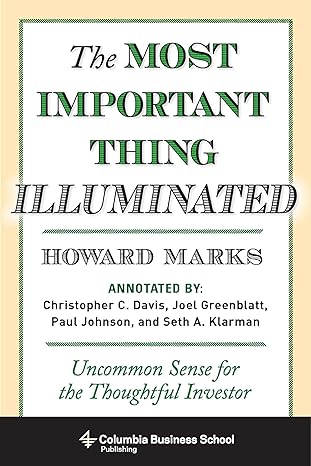Overview : The Most Important Thing Illuminated Book
- Book Title: The Most Important Thing: Uncommon Sense for the Thoughtful Investor
- Author: Howard Marks
- Publication Date: May 1, 2011
- Rating: 4.8
- price: $23.44
- Pages: 194
Author Information
Howard Marks is a renowned figure in the investment world, known for his insightful market commentaries and successful track record. With over 50 years of experience in the financial industry, Marks brings a wealth of knowledge and practical expertise to his writing.
Introduction to The Most Important Thing Illuminated Book
In the ever-evolving world of finance and investing, few voices carry as much weight as that of Howard Marks. As co-founder of Oaktree Capital Management, Marks has spent decades honing his investment philosophy, and in "The Most Important Thing: Uncommon Sense for the Thoughtful Investor," he distills this wisdom into a compelling guide for both novice and seasoned investors.
The Most Important Thing Illuminated Book Summary
At its core, "The Most Important Thing" is not just another investment manual; it's a philosophical treatise on how to think about markets, risk, and decision-making in the financial realm. Marks challenges readers to engage in "second-level thinking," looking beyond surface-level analysis to understand the deeper implications of market movements and investment decisions.
Key Themes
- Risk Management: Marks emphasizes that understanding and managing risk is paramount to investment success.
- Market Cycles: The book delves into the cyclical nature of markets and how to navigate these fluctuations.
- Contrarian Thinking: Marks advocates for the value of going against the crowd when opportunities arise.
- Emotional Discipline: The importance of maintaining a level head in the face of market volatility is a recurring theme.
- Humility in Investing: Marks stresses the need for investors to acknowledge their limitations and learn from mistakes.
Analysis of Themes
The Primacy of Risk Management
In an era where cryptocurrencies and high-risk investments dominate headlines, Marks' focus on risk management is particularly relevant. He argues that preserving capital should be the primary concern of any investor, a principle that aligns with traditional banking practices but is often overlooked in today's fast-paced market environment.
Navigating Market Cycles
Marks' insights into market cycles provide a valuable framework for understanding current market trends. By recognizing patterns of excessive optimism and pessimism, investors can better position themselves to capitalize on opportunities in various sectors, from traditional stocks to emerging asset classes like cryptocurrencies.
The Power of Contrarian Thinking
In a world where financial news and social media can create echo chambers, Marks' emphasis on contrarian thinking is refreshing. This approach encourages investors to look beyond popular narratives and seek undervalued opportunities, a strategy that has proven effective in both bull and bear markets.
Writing Style
Marks' writing is clear, concise, and accessible, making complex financial concepts understandable to a broad audience. He uses anecdotes and real-world examples to illustrate his points, creating an engaging reading experience that balances theory with practical application.
The Most Important Thing Illuminated Book Strengths and Weaknesses
Strengths:
- Timeless principles applicable to various market conditions
- Emphasis on critical thinking and independent analysis
- Practical advice grounded in decades of experience
Weaknesses:
- May be too philosophical for readers seeking specific investment strategies
- Limited discussion of newer investment vehicles like ETFs or cryptocurrencies
The Most Important Thing Illuminated Book Alternatives
While "The Most Important Thing" shares some similarities with classics like Benjamin Graham's "The Intelligent Investor," it stands out for its focus on thought processes rather than specific valuation techniques. Compared to more recent works like Ray Dalio's "Principles," Marks' book offers a more targeted focus on investment philosophy.
Key Quotes
"The most important thing is figuring out what the most important thing is." "Successful investing requires thoughtfulness and critical thinking about issues that are subtle, complex, and always-changing."
Highlights from The Most Important Thing Illuminated
Risk Management: Emphasizes managing risks over simply pursuing high returns, as minimizing losses is key to long-term success.
Second-Level Thinking: Successful investors think beyond the obvious, questioning assumptions and assessing a deeper perspective on value.
Understanding Market Cycles: Recognizes the importance of market cycles and positioning investments to benefit from them.
Margin of Safety: Investing with a margin of safety helps protect against unexpected downturns, reducing potential losses.
Avoiding Herd Mentality: Stresses the importance of independent thinking rather than following popular trends.
Patience and Discipline: Investing requires patience and a disciplined approach, not rushing to chase profits.
Conclusion
"The Most Important Thing" is an invaluable resource for anyone serious about improving their investment acumen. Howard Marks' insights into risk management, market cycles, and contrarian thinking provide a robust framework for navigating the complexities of today's financial markets. Whether you're a seasoned professional or just starting your investment journey, this book offers timeless wisdom that can help shape a more thoughtful and disciplined approach to personal finance and investing.





